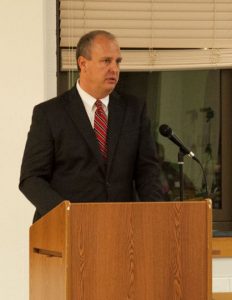Intense public interest in three incidents at Unionville-Chadds Ford School District Schools earlier this academic year led to a community conversation on school security and the safety of students and employees.
Those incidents included a parent who left a loaded pistol in the door of an unoccupied, unlocked car while the engine was running, high school students who were drinking alcohol on a school bus, and a hunting knife that was found in a student’s truck parked at Unionville High School.
Superintendent of Schools John Sanville said he received hundreds of emails following each of the incidents and thought having the community conversation was the appropriate way to learn what the community at large felt were safety and security priorities.
The Nov. 11 gathering in the Unionville High School cafeteria also included remarks from Charles Gaza, the chief of staff for Chester County District Attorney Tom Hogan.
Both Sanville and Gaza said school and county agencies began examining security procedures with greater scrutiny following the 2013 Sandy Hook Elementary School shootings in Newtown, Conn.
“One of our priorities was to reach out to law enforcement, chiefs of police, all school superintendents, school boards and teachers to focus on how to make our schools safer,” Gaza said.
Part of the assessment of school buildings in particular, Gaza said, was to look at various risk factors to determine how easily accessible the schools were to an unwanted intruder, how readily someone could enter the building through rear and side doors, and how easy it would be to bypass security personnel.
Gaza said the county then went back to the school districts and advised them about what needed to be addressed.
But Gaza added that the county response was to look at venues other than just the schools in Chester County, and to look not just at shootings, but what he termed “active threats,” such as stabbings. The county looked at anywhere there is a large number of people. He referred to the Aurora, Colo. movie theater shooting and the shooting in response to a stabbing at the Chester County Justice Center this past August.

County officials talked with the FBI and began training local law enforcement officers on how to react to a threat, stop the threat, and control the naturally ensuing chaos that follows such incidents.
In addressing school safety issues, Gaza said the district attorney’s office also looked at narcotics use.
“Narcotics overdose is one of the greatest threats in the county to our students. Narcotics overdose and narcotics overdose prevention is something everyone here has some control over,” he said.
According to Gaza, many students who wind up using heroin began by taking their parents’ unused prescription pain medications, such as Oxycontin, a semi-synthetic opioid.
“Unwittingly, there is a very good chance that you’ll become your child’s first drug dealer,” Gaza said.
He explained that because they’re prescription drugs, people think they’re safe to take and that even middle school-aged students begin taking them. However, it’s easy to become addicted to those pain meds, but they are expensive to buy on the street, $20 to $30 per pill. A hit of heroin, he said, is only about $6.
“It’s a very short step for them to go from Oxycontin to heroin,” Gaza said.
Cyber-bullying and sexting among students is another safety matter.
Gaza, whose own children are in the U-CF School District, examines his children’s phones when he gets home to make sure they’ve not engaged in any unsafe practices. He reminded parents that whatever goes out onto the web or anywhere in cyberspace, it’s there forever.
“[The Internet] is the Sharpie of the 21st century. Everything you put onto the Internet, onto the web, you’ve lost control over. Once you’ve sent it to one person, you’ve lost control over where it goes,” Gaza said.
He mentioned a sexting case involving students that led to cyber-bullying in the Tredyffrin-Easttown School District that the D.A.’s office investigated. (For more on that go here .)
He said the problems mentioned are not unique to Unionville-Chadds Ford. He credited the district for no longer trying to hide the presence of such problems, that it’s now willing to work with law enforcement to resolve issues.
In response to the suggestions from the county after Sandy Hook, Sanville said the district came up with a 31-point action plan to help keep the 4,100 students and the 650 school employees safe.
He did not go into many details of the plan, saying the district didn’t want to let the bad guys know what was being done, but he did mention some things that have been implemented.
Visitors to the schools must show a valid identification, and they get a temporary pass with their photo and where in a school they will be visiting. Each outer door bears a number so that authorities can know where an intruder or a responding officer might be located.
In addition, he said, outer doors and windows are lined with safety film that prevents the glass from shattering, even from gunfire.
The audience saw a brief video showing that it would take an armed intruder at least an additional 90 seconds to break through the film and that would provide police ample time to respond.
Another precautionary step is that a private security firm that uses dogs to check for gunpowder, drugs, and alcohol periodically checks school buildings and grounds.
Sanville said the knife in the student’s truck was found when one dog “hit” on gunpowder. It turned out the student hunts, and while there was no firearm in the vehicle, the dog reacted to the scent of gunpowder. The student had accidentally left his knife in the truck.
Following the presentations, the audience broke into groups to discuss various security and safety concerns, and to answer several questions.
The district wants to know how it can encourage students and families to report possible issues, or what parents should do if they see students that are having a party at a home when those parents are out of town.
Other questions involved how parents think they and the district can keep students safe in the new cyber world, how the district should determine what weapons may be appropriate, what the greatest security issues might be and what the schools, parents, families, and community can do to improve students’ safety.
Sanville said the results would be made public in about a week.
About Rich Schwartzman
Rich Schwartzman has been reporting on events in the greater Chadds Ford area since September 2001 when he became the founding editor of The Chadds Ford Post. In April 2009 he became managing editor of ChaddsFordLive. He is also an award-winning photographer.


 (7 votes, average: 4.00 out of 5)
(7 votes, average: 4.00 out of 5)
It would help parents if there was a consistent way we could be informed about new apps and their use or misuse, perhaps cooperation between the local “cybercops” and district. Also, the parent who left the gun in the car was never charged. What about the student with the hunting knife. There should not be a double standard.